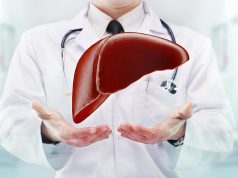Improved survival seen with structured program in patients with resected colon cancer who have completed adjuvant chemo
By Elana Gotkine HealthDay Reporter
TUESDAY, June 3, 2025 (HealthDay News) — For patients with resected colon cancer who have completed adjuvant chemotherapy, a three-year structured exercise program results in significantly longer disease-free survival, according to a study published online June 1 in the New England Journal of Medicine to coincide with the annual meeting of the American Society of Clinical Oncology, held from May 31 to June 4 in Chicago.
Kerry S. Courneya, Ph.D., from the University of Alberta in Edmonton, Canada, and colleagues conducted a phase 3 randomized trial at 55 centers involving patients with resected colon cancer who had completed adjuvant chemotherapy to participate in a structured exercise program (exercise group) or to receive health education materials alone (health education group) during a three-year period (445 and 444 patients, respectively).
The researchers found that at a median follow-up of 7.9 years, disease-free survival was significantly longer in the exercise group versus the health education group (hazard ratio for disease recurrence, new primary cancer, or death, 0.72). Five-year disease-free survival was 80.3 and 73.9 percent in the exercise and health education groups, respectively. The results supported longer overall survival in the exercise group versus the health education group (hazard ratio for death, 0.63). Eight-year overall survival was 90.3 and 83.2 percent in the exercise and health education groups, respectively. Compared with the health education group, musculoskeletal adverse events occurred more often in the exercise group (18.5 versus 11.5 percent of patients).
“Our trial provides robust evidence of a substantial benefit-to-harm ratio in favor of structured exercise over a sedentary lifestyle and supports its incorporation into standard care,” the authors write. “Knowledge alone, however, is unlikely to change patient behavior and outcomes. To achieve meaningful increases in exercise will require that health systems invest in behavior-support programs.”
Copyright © 2025 HealthDay. All rights reserved.








